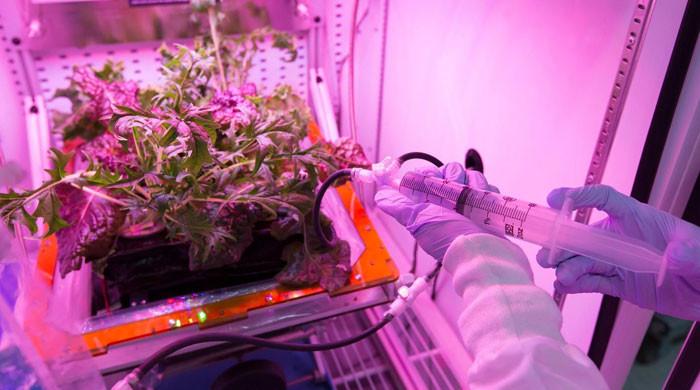Lettuce grown on International Space Station is popular among astronauts but researchers think it’s not healthy
Space lettuce has been popular on the International Space Station (ISS), with astronauts enjoying the leafy greens in a space garden called Veggie and even chewing on a patch of red leaf lettuce that they grow themselves.
However, scientists have discovered that lettuce grown in a simulated microgravity environment on Earth is more susceptible to infections like E coli or Salmonella than lettuce grown in space and may not be as safe for astronauts.
A paper recently published in Scientific Reports revealed that a group of researchers grew plants in a device called a clinostat, which rotated them like a rotisserie chicken so that they would lose their sense of directionality, Gizmodo reported.
“In effect, the plant would not know which way was up or down,” Noah Totsline, the lead author of the new paper, said in a statement. “We were kind of confusing their response to gravity.”
Plants have gravity-sensing cells that cause their roots to grow downwards, while the plant shoots upwards. However, in microgravity environments, the plant’s natural defence against stressors is less effective.
Stomata, tiny pores in leaves and stems, help breathe and close when they sense stressors like bacteria. During their carnival ride on the clinostat, plants became disoriented and opened up their pores in the presence of bacteria, according to the research.
“The fact that they were remaining open when we were presenting them with what would appear to be a stress was really unexpected,” Totsline said.
From the experiment, the researchers concluded that bacteria like Salmonella can invade leaf tissue more easily in simulated microgravity conditions, like the one on the ISS.
A 2020 study on the first lettuce crop grown on the ISS between 2014 and 2016 revealed that while lettuce had the same nutrient content as Earth’s variety, it exhibited higher levels of bacteria.
Despite efforts to mitigate microgravity, the ISS’s closed-air environment with astronauts living in its headquarters may expose plants to pathogens, potentially affecting the Veggie system, which is a nutritious food source for future missions to the Moon or Mars.
Researchers are proposing to modify the genetics of space lettuce to prevent wider stomata opening in space, thereby reducing the risk of bacterial infections for astronauts consuming the greens.
They are currently testing various lettuce varieties in a simulated microgravity environment.

